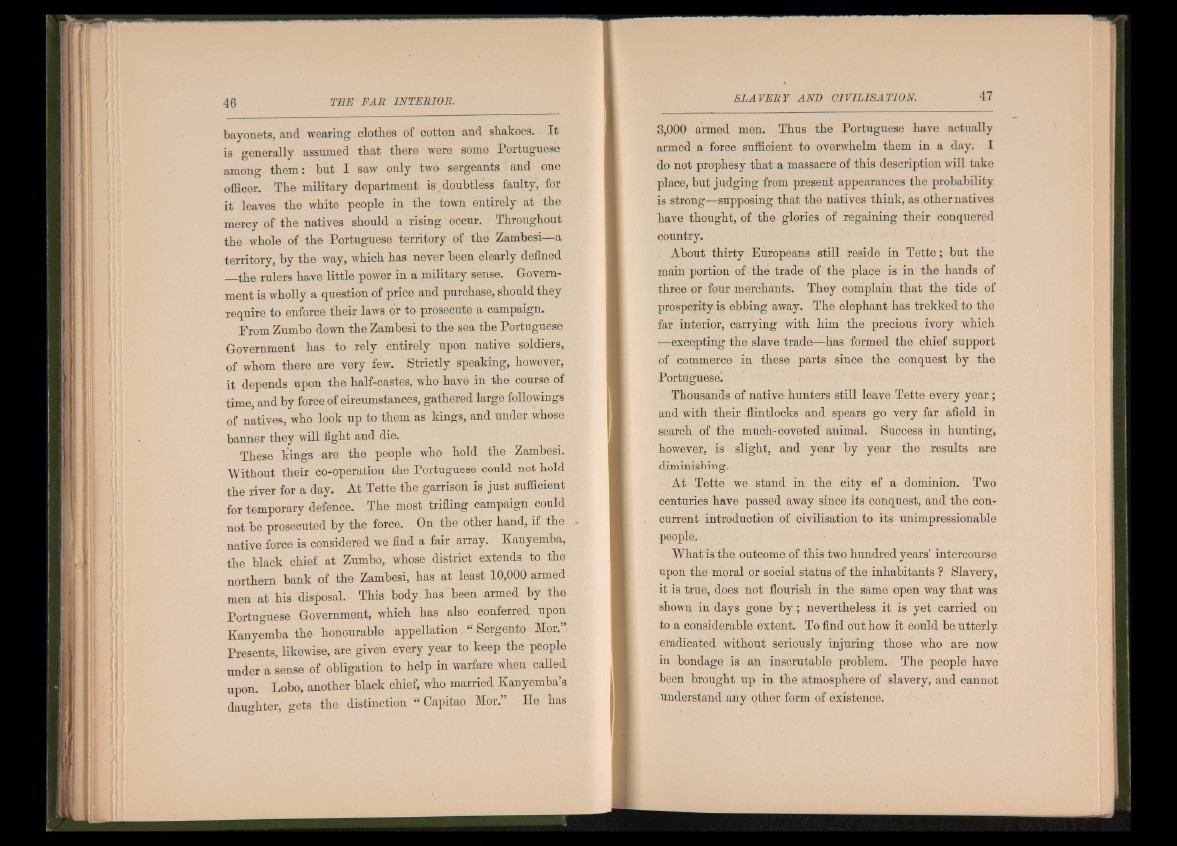
bayonets, and wearing clothes of cotton and shakoes. I t
is generally assumed that there were some Portuguese
among them: but I saw only two sergeants and one
officer. The military department is doubtless faulty, for
it leaves the white people in the town entirely at the
mercy of the natives should a rising occur. Throughout
the whole of the Portuguese territory of the Zambesi—a
territory, by the way, which has never been clearly defined
the rulers have little power in a military sense. Government
is wholly a question of price and purchase, should they
require to enforce their laws or to prosecute a campaign.
From Zumbo down the Zambesi to the sea the Portuguese
Government has to rely entirely upon native soldiers,
of whom there are very few. Strictly speaking, however,
it depends upon the half-castes, who have in the course of
time, and by force of circumstances, gathered large followings
of natives, who look up to them as kings, and under whose
banner they will fight and die.
These kings are the people who hold the Zambesi.
Without their co-operation the Portuguese could not hold
the river for a day. At Tette the garrison is just sufficient
for temporary defence. The most trifling campaign could
not be prosecuted by the force. On the other hand, if the
native force is considered we find a fair array. Kanyemba,
the black chief at Zumbo, whose district extends to the
northern bank of the Zambesi, has at least 10,000 armed
men at his disposal. This body. has been armed by the
Portuguese Government, which has also conferred upon
Kanyemba the honourable appellation “ Sergento Mor. ,
Presents, likewise, are given every year to keep the people
under a sense of obligation to help in warfare when called
upon. Lobo, another black chief, who married Kanyemba’s
daughter, gets the distinction “ Capitao Mor.” He has
3,000 armed men. Thus the Portuguese have actually
armed a force sufficient to overwhelm them in a day. I
do not prophesy that a massacre of this description will take
place, but judging from present appearances the probability
is strong—supposing that the natives think, as .other natives
have thought, of the glories of regaining their conquered
country.
About thirty Europeans still reside in Tette; but the
main portion of the trade of the place is in the hands of
three or four merchants. They complain that the tide of
prosperity is ebbing away. The elephant has trekked to the
far interior, carrying with him the precious ivory which
—excepting the slave trade—has formed the chief support
of commerce in these parts since the conquest by the
Portuguese!
Thousands of native hunters still leave Tette every year;
and with their flintlocks and spears go very far afield in
search of the much-coveted animal. Success in hunting,
however, is slight, and year by year the results are
diminishing.
At Tette we stand in the city ©f a dominion. Two
centuries have passed away since its conquest, and the concurrent
introduction of civilisation to its unimpressionable
people.
What is the outcome of this two hundred years’ intercourse
upon the moral or social status of the inhabitants ? Slavery,
it is true, does not flourish in the same open way that was
shown in days gone b y ; nevertheless it is yet carried on
to a considerable extent. To find out how it could be utterly
eradicated without seriously injuring those who are now
in bondage is an inscrutable problem. The people have
been brought up in the atmosphere of slavery, and cannot
understand any other form of existence.